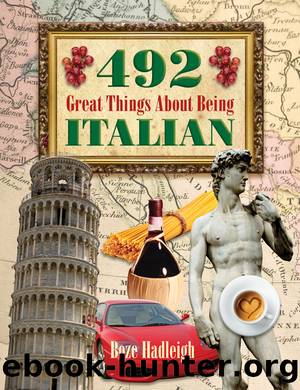492 Great Things About Being Italian by Boze Hadleigh

Author:Boze Hadleigh
Language: eng
Format: epub
Publisher: Skyhorse Publishing
Published: 2015-08-21T00:00:00+00:00
Ruggero Leoncavallo, whose surname means lion-horse, wrote his first opera at age 18 but is best known for the 1892 one-act opera I Pagliacci (The Clowns), a tale of love, jealousy, and murder performed more naturalistically than was usual. Its high point is the celebrated aria âVesti la Giubbaâ (Put On the Costume), in which the bitter, cuckolded clown laughs through his tears. Enrico Carusoâs 1902 recording of the song was the first million-selling record in history.
Alas, success seldom visited the Neapolitan Leoncavallo (1858-1919), whoâd planned to finance his first opera with his own savings, except that his producer fled with the funds, reducing the youth to earning his bread performing music in coffeehouses.
Later, his friend Giacomo Puccini stole Ruggeroâs idea for another opera, which became the hit La Boheme. Leoncavalloâs opera of the same name opened after Pucciniâs, and wilted in its shadow. With producers and friends like those. . . .
Sergio Leone was a frankly commercial director, producer and screenwriter. Most closely associated with spaghetti westerns and gangster films, the Roman (1929-1989) declined to direct The Godfather in favor of his own gangster epic, Once Upon a Time in America (1984). Starring Robert De Niro, it consumed years of Leoneâs time; Warner Bros. trimmed his four-hour version to two hours, but it flopped anyway.
In the 1950s, Sergio, whoâd been an assistant to Vittorio de Sica, penned sword-and-sandal screenplays. His directorial bow had him replacing Mario Bonnard, who was too ill to helm The Last Days of Pompeii (1959), starring Steve âHerculesâ Reeves, an American made a star in Italy.
Leoneâs signature style often alternated extreme close-ups with lengthy long shots. âSubtlety,â he declared. âI canât even pronounce it.â
The Leopard (Il Gattopardo) is known to most non-Italians only via the lavish 1963 Luchino Visconti film starring Burt Lancaster, Claudia Cardinale, and Alain Delon. However, in Italy the novel by Giuseppe Tomasi, Duke of Palma and Prince of Lampedusa (1896-1957), is a national epic on a par with Gone with the Wind in the United States. Tomasi was part of the fading Sicilian aristocracy that heralded back to the Norman eleventh century and ended in 1860 when Garibaldi ejected the Bourbons from Italy. It was about this transition and these once-privileged characters trying to fit into the new order that Tomasi wrote.
As Tomasi lay on his deathbed, his manuscript was sent anonymously to a female writer-editor in Rome who didnât read it. It then reached a Milanese publisher who passed it to a Sicilian novelist who read it, deemed it too âessayish,â and wrote to the failing Tomasi to tell him so. Tomasi died, but then a novelist-editor to whom the female writer had sent the manuscript traveled to Palermo and at the late princeâs home found another manuscript in the authorâs handwriting that included important additions to the novelâand that was the version brought to light by the Feltrinelli publishing house of Milan in 1958. It became the top-selling novel in Italian history.
The English title is a misnomer. Leopard in Italian is leopardo.
Download
This site does not store any files on its server. We only index and link to content provided by other sites. Please contact the content providers to delete copyright contents if any and email us, we'll remove relevant links or contents immediately.
| Belgium | France |
| Germany | Great Britain |
| Greenland | Italy |
| Netherlands | Romania |
| Scandinavia |
Room 212 by Kate Stewart(5106)
The Crown by Robert Lacey(4808)
Endurance: Shackleton's Incredible Voyage by Alfred Lansing(4772)
The Iron Duke by The Iron Duke(4350)
The Rape of Nanking by Iris Chang(4205)
Joan of Arc by Mary Gordon(4104)
Killing England by Bill O'Reilly(3998)
Say Nothing by Patrick Radden Keefe(3976)
I'll Give You the Sun by Jandy Nelson(3431)
Shadow of Night by Deborah Harkness(3361)
Hitler's Monsters by Eric Kurlander(3331)
Mary, Queen of Scots, and the Murder of Lord Darnley by Alison Weir(3208)
Blood and Sand by Alex Von Tunzelmann(3198)
Eleanor & Park by Rainbow Rowell(3153)
Darkest Hour by Anthony McCarten(3120)
Margaret Thatcher: The Autobiography by Thatcher Margaret(3081)
Book of Life by Deborah Harkness(2935)
Red Famine: Stalin's War on Ukraine by Anne Applebaum(2930)
The One Memory of Flora Banks by Emily Barr(2857)
